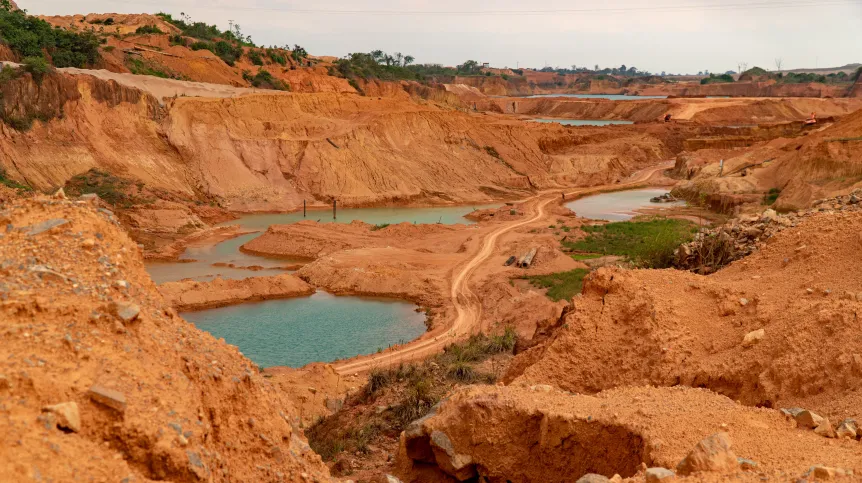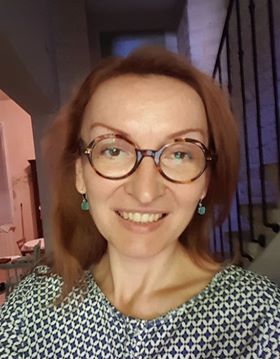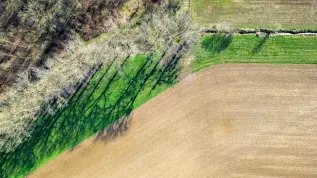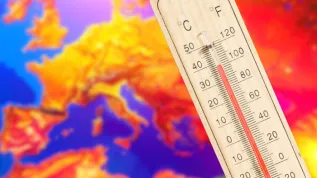
In Kenya, the changing climate is disrupting the seasons; the region suffers from water shortages. Brazil faces the predatory exploitation of natural resources. An international team including scientists from Poland wants to support these communities in building the planet's 'resistance' to changing conditions.
Climate change, exploitation of natural resources and declining biodiversity - these are the problems that more and more countries are facing. The international MOSAIC project will design and implement open information systems that will support cross-border communities in understanding the impact of the environment on their well-being, building a health-promoting environment and influencing public policies and decisions.
'Scientists representing many scientific disciplines, unrelated in the classical scientific approach, will collectively build condition indicators and risk indicators, along with prediction of the quality of natural environment conditions and their health impact,’ says Dr. Aneta Afelt from the Interdisciplinary Center for Mathematical and Computational Modeling at the University of Warsaw (ICM UW), Polish research leader in the MOSAIC project.
The scientists plan to test existing indicators and create new ones using machine learning techniques, AI, agent modelling, etc. These solutions will then be tested by community members in the so-called living laboratories, i.e. selected cross-border communities in Africa and South America.
HOW TO FIGHT DROUGHT IN KENYA
In Kenya, scientists will work with the Maasai community. 'Access to good quality pasture for grazing cattle, which is the basis of economic resource, is crucial for the well-being of the Maasai community. Drought leads to a reduction in the productivity of herds and their mass extinction, which has a very significant impact on the integrity of the Maasai,’ Dr. Afelt says.
Therefore, the researchers will cooperate to create forecasting tools for drought risk and grazing quality. 'We will also carry out field monitoring of public health and veterinary medicine, along with implementing good practices,’ adds Afelt.
She explains that in Kenya, the changing climate is disrupting the seasons - the transition between dry and wet periods.
'Dry periods are getting longer, while sudden, short-term rainfall unfortunately does not meet the retention demand of soil moisture. The region suffers from water shortage, and cattle grazing conditions are deteriorating in large areas,’ Afelt says.
For local communities whose primary income depends on the success of milk production and herd reproduction, drought has severe consequences. 'When a family or group loses its herd, it is most often forced to migrate to urban areas, or rather suburban slums, where living and health conditions are questionable at best,’ says Afelt.
WHAT ABOUT OVEREXPLOITATION OF DEPOSITS IN BRAZIL
In turn, in South America, scientists will operate in the Amazon, working with cross-border mining communities (on the French Guiana and Colombia borders). 'Our goal is to cooperate to reduce the risk of transmission of zoonotic diseases (including malaria) and degradation of the natural environment,’ Afelt continues.
The problem in Brazil is the predatory exploitation of natural resources. Ad hoc mines lead not only to deforestation of the Amazon, but above all to long-term chemical pollution of the environment.
'Local communities are then exposed not only to the epidemiological threat resulting from the transmission of zoonoses (zoonotic diseases - ed. PAP), but also to low quality of drinking water and food,’ Afelt says.
In her opinion, it is important to educate and 'jointly implement activities that support the quality of life and health of groups by changing habits, work techniques and understanding cause and effect relationships'.

'Pocket-sized but very rapid deforestation of the area for the purposes of mining exploration and the use of chemicals in technological processes not only result in a complete degradation of the original ecosystem, but also cause irreversible damage to water resources on a scale of human life,’ Afelt says, adding that a contaminated area 'rarely returns to natural vitality on its own'.
Meanwhile, exposure to unfavourable environmental conditions directly affects the health of miners and their families: 'the fertility rate decreases, and diseases that are a consequence of exposure to animals and chemicals become common,’ the researcher says.
HOW TO BUILD TRUST
In practice, in the case of both geographical regions, cooperation requires overcoming cultural barriers and building the trust of local community members in the possibilities offered by modern research tools. On the other hand, according to Afelt, scientists need to be open to accepting data that exist in communities and understanding their importance in complementing scientific knowledge.
Cooperation with local communities is intended to result in the implementation of developed practical solutions, and contribute to the development of science and research methods and techniques. 'In about two years, we will be able to verify the first results of our activities,’ Afelt says.
EXTENSIVE DATA SETS
The Polish project team from the Interdisciplinary Center for Mathematical and Computational Modeling at the University of Warsaw (ICM UW) will be one of the key players in the project, as it will collect, process and share high-quality data. 'We have one of the best IT teams in the world at ICM, very experienced in conducting research projects, led by Łukasz Dumiszewski,’ says Afelt.
The IT team will be responsible for preparing the data infrastructure for the entire project.
'This is not a trivial matter. The project will involve research groups that for several years have been creating their own, thematically and geographically independent tools and data, which will need to be harmonised,’ Afelt says.
Researchers working on the project will use large external data sets (e.g. satellite, meteorological, primary and secondary data), locally generated data coming directly from local communities, as well as huge data sets that will be used to test methodological solutions for the environmental condition indicators implemented in the project.
The platform built at ICM UW will be the source of input data, and at the same time collect output data resources, in accordance with FAIR requirements (FAIR stands for findable, accessible, interoperable and reusable). Data produced by the MOSAIC project will be made available in the public domain, in accordance with the principles of Open Science.

The MOSAIC project (Multi-site application of Open Science in the creAtion of healthy environments Involving local Communities) will be implemented by a consortium of fifteen institutions from seven countries: France, Poland, Portugal, Kenya, Brazil, the USA and Colombia. The project received funding in the 'Environment and health - Planetary health' competition of the Horizon Europe programme, and its financing amounts to approximately EUR 6 million. Spending is planned in three areas: covering the costs of cooperation with local communities; increasing the number of research groups by opening research internships at the master's, doctoral and post-doc levels, and engineering staff; and publishing research results.
'The financing for the project will primarily support research groups working for many years with cross-border communities in Kenya and Brazil, supplement their technical resources and improve working conditions,’ says Afelt.
The leader of the project is the French National Research Institute for Sustainable Development (Institut de Recherche pour le Développement). (PAP)
PAP - Science in Poland, Anna Mikołajczyk-Kłębek
amk/ bar/ kap/
tr. RL













